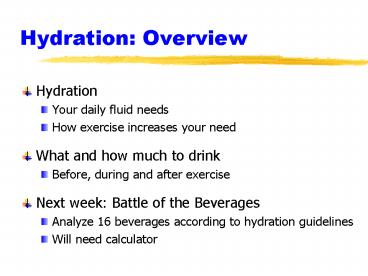Hydration: Overview PowerPoint PPT Presentation
1 / 17
Title: Hydration: Overview
1
Hydration Overview
- Hydration
- Your daily fluid needs
- How exercise increases your need
- What and how much to drink
- Before, during and after exercise
- Next week Battle of the Beverages
- Analyze 16 beverages according to hydration
guidelines - Will need calculator
2
Your Daily Fluid Needs
- Drink water throughout day
- Your fluid needs
- Body weight (lbs.) divided by 2 ounces per day
- When exercising, thirst not good indicator of
fluid needs - Do not overhydrate
- Indicators of hydration
- Pale yellow urine
- Relatively frequent
3
Exercise Increases Fluid Needs
- Need adequate fluids to keep body temperature and
blood volume within normal range. - Working muscles generate heat. The body sweats
(loses water) to get rid of heat. - If water is not replaced, the body decreases
sweat rate to conserve blood volume - The body still needs to get rid of heat.
- Some of the blood that was taking oxygen to
muscle is diverted to the skin to get rid of heat - Heart works harder to move blood
- Dehydration ? heart rate body temperature
4
- Proper hydration sets the stage for optimal
performance
5
Pre-Exercise Hydration
- Athletes who avoid fluids prior to exercise
- Fatigue more quickly
- Complain of dizziness
- Experience faster rise in core body temperature
- Have increased heart rate
- Perform sub optimally
6
Before Exercise Fluid Intake
- Drink 8-16 oz. (1-2 c.) of water or fluids about
2 hours prior - Consuming fluid prior to exercise lowers core
temps heart rates during exercise when compared
with no fluid consumption.
7
Alcohol
- Poor energy source because it doesnt contribute
to muscle glycogen - Heavy drinking can promote dehydration
- Moderate drinking not likely to harm performance
if properly hydrated. - Women 1 drink men 2 drinks
- Dont use to replace fluids after exercise.
8
Caffeine as Ergogenic Aid
- 1 hour prior 3-6 mg of caffeine per kg. of body
weight improves performance during prolonged
endurance exercise. - Benefits of caffeine
- Decreases the perception of fatigue
- May increase the force of muscle contractions
- Increases the use of fat as a fuel for muscle
- How much caffeine do you need for ergogenic
effect?
9
How Much Do you Need?
- Weight (lbs) 2.2 Kilograms
- Weight (kg) x 3 mg lower limit of caffeine (mg)
- Weight (kg) x 6 mg upper limit of caffeine (mg)
10
Caffeine in Drinks
Drink Amount Caffeine
Regular Coffee 16 ounces 200-400 mg
Espresso 1 shot 75 mg
Black or Green Tea 8 ounces 20-50 mg
Arizona Iced Tea 8 ounces 11 mg
5-Hour Energy 2 ounces 207 mg
Energy Drinks 8 ounces 80 mg
Coke 12 ounces 35 mg
11
During Exercise
- Thirst not adequate indicator of need during
exercise - Create hydration plan
- Exercise lt60 minutes
- Water to replace fluids and keep body temp from
? - Exercise gt60 minutes
- Sports drink for increased stamina. They provide
water, glucose sodium
12
Sports Drinks Performance
13
During Exercise Carbohydrates
- Choose a drink with 4-8 carb content
- Cool drinks may increase consumption not
absorption - gt8 carbs can lead to cramping, bloating
vomiting - What type of carbohydrates (sugars)?
- Glucose (dextrose), sucrose (sugar)
maltodextrin absorbed faster than fructose - Many sports drinks use minimal fructose
- Do not choose drinks with 1st ingredient fructose
(or high fructose corn syrup) - Several types of sugar increase absorption
14
During Exercise Electrolytes
- Sodium, chloride potassium maintain
- Body fluid levels
- Muscle contractions
- Nerve impulses
- Sodium is most important to replace
- Consume 100-200 mg per 8 oz.
- Dont take potassium supplements
- Choose drinks with lt10 DV for potassium
15
During How much to drink?
- 4-8 oz (1/2 -1 c.) every 10-20 min 24 oz./hour
- 30-60 grams glucose/hr
- gt 60 grams/hr.-bloating, cramping diarrhea
- Small amounts better tolerated than large
amounts.
16
After Exercise
- Drink 24 oz. (3 c.) fluid for every lb. lost
- Sodium in drinks help promote hydration
- A good time to replenish other electrolytes
potassium, calcium - Monitor hydration by urine color volume
17
After Exercise Carbohydrates
- Within 30 minutes after exercise
- Best to consume carb drink - chocolate milk or
sports drink - Sucrose (sugar) and glucose are better at
restoring glycogen than fructose from fruit - Replacing glycogen after strenuous training helps
minimize fatigue for next training session - First 2 hours, replaced at 8 per hour then
5/hour

